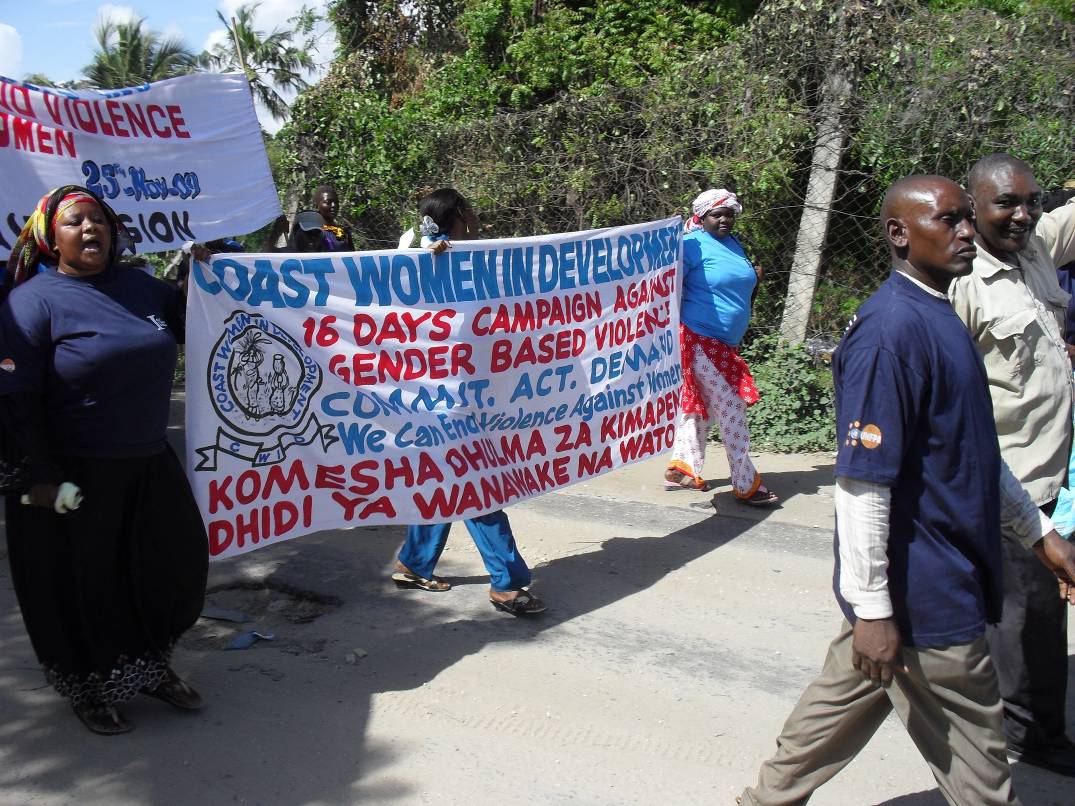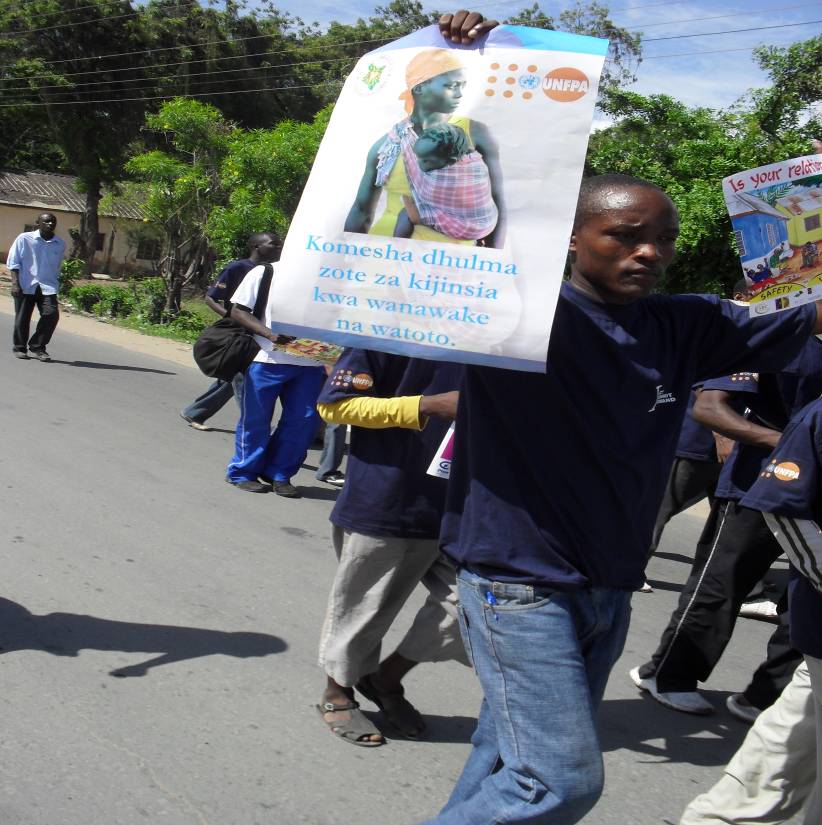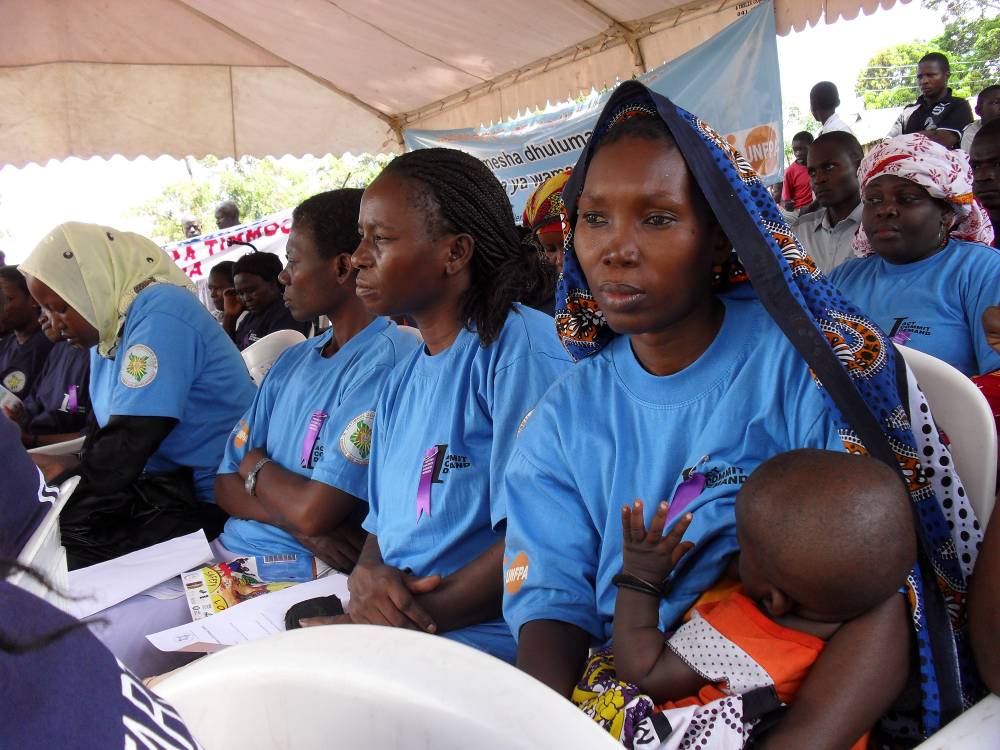|
16 DAYS CAMPAIGN 2009 Introduction. Once again 25th November was here again, another 16 days campaign against Gender Based Violence, women at Mishomoroni , Kisauni Location had all the reasons to smile as they matched in one voice in a one kilometer procession distributing materials to the public and carrying the banner with the message ‘COMMITT ACT DEMAND, WE CAN END VIOLENCE AGAINST WOMEN, and with a sub theme that characterizes the GBV that is common in this Coastal Region of Kenya, ‘Komesha dhulma za kimapenzi dhidi ya wanawake na watoto.’ Stop sex tourism on women and children.
At the procession with the village elder in navy blue T-shirt leading the crowd. In collaboration with NCGD, Coast Women In Development was able to bring the day to one of her major successes, other stake holders from the government and the civil societies joined us in launching the 16 days campaign. Members of the public and civil societies, joined in the procession as we walked together to the venue of the launch. Around 500 people gathered at the grounds that the launching was taking place and many of them got t-shirts with this year’s 16 days campaign theme together with the 16 days campaign purple ribbons. It was a colourful event at Kadongo grounds as the women sang and chanted songs on the need for the women to demand for their rights and that of the children. The plays and poems presented at the event were all addressing the need for parents and all stakeholders to commit and act on the GBV issues appropriately. Objectives.
All the speeches made at the launch based on this one fact- nothing much has been done to combat gender based violences within the region, begining for the top, that is our government to our own families. The speakers pointed to the fact that’s most people mistake gender issues to just that of the women and children, the speakers clearly illustrated that gender also involve men because in researches have also revealed that some men also suffer GBV though they do not come out in the open to report. Some of the issues that arouse in the event were; Root eradication of GBV As stake holders engage if getting to ways of eradicating GBV, it was clear that the fight can be successful if it starts from the families, parents have a duty to act responsibly by bringing up their children not in a ender biased way, the children should grow up knowing they have equal rights so that they can treat each other equally. Women also have a duty to stand upright and bring peace in their families by ensuring equality in all aspects.
The harmonized draft constitution. And with the harmonized draft constitution out for the public to table their recommendations, women felt that though some of their issues have been addressed in terms of representations in the government, other sensitive issues have been left out, women therefore are going to safeguard the gains they have received from the draft constitution and still push for more changes.
Shirikisho women group listening to the speeches. Women empowerment. There arouse a need for the women to be empowered through education, it was revealed that most women especially at the grassroots are not well educated and even after the free education, most of them still refuse to access education, believing their position is still in the ‘kitchen’ women were advised to be development lovers and take advantage of all education opportunities because education is power. HIV/AIDS Women were also advised to be on the fore front to fight HIV/AIDS since it is also linked with GBV, may women are infected with the disease unknowingly thus affecting them psychologically and economically especially if they are not empowered enough to know how to live positively. Children’s responsibility Children have a right to education, medical care and shelter and it is the responsibility of the parent or guardian to ensure that these rights are protected and that every child enjoy these rights, parents should also ensure that they involve their children in all the affairs pertaining their family issues. Children also have a responsibility to be obedient and respect their parents and guardians.
Opening up to our children. It also emerged that parents and guardians do not open up and talk to their children about issues of sex, GBV and AIDS. This has led to the children making their own assumptions and settling unguided decisions for themselves, it has also steered them to reach out for other sources such as the media to access to information about the vices. The repercussion for this is an exploited generation of youths. Parents therefore were advised to talk to their children on issues affecting them, most of the children who suffer GBV do so in silence because they are not aware that they are abused, children should therefore be taught about sex and to know when and how they can are violated, either physically or psychologically. Parents also be to be very keen on their children affairs to discover and act on any suspicious behaviors that they notice. Police Gender Desks. Most of our gender desks at the police stations are situated in corners that are unfriendly to the GBV survivors. The desks are in places that are not confidential thus making it difficult for the survivors to open up and fully give their statements. The officers sitting at the gender desks also need training on handling GBV cases and the survivors, most of them are rowdy and carelessly treat the survivors, this has opted many of the survivors to give up following on their cases while others do not completely report their cases in fear of how they will be shamelessly handled. It was encouraging as the village elder who was also our master of ceremony for the day encouraged his residents to join in the fight to reduce GBV and to join the existing women groups so that they can initiate development projects in the region.
Appreciation
|


